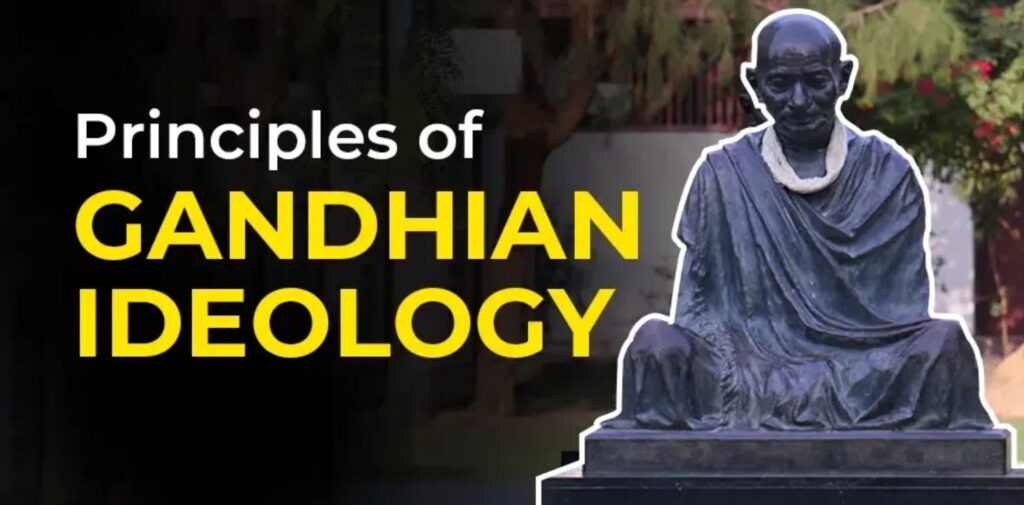Mahatma Gandhi, the father of the Indian nation, is a towering figure in the history of India’s independence struggle. His philosophy of non-violence, truth, self-reliance, and social justice not only helped India achieve independence from British colonial rule but also left an indelible mark on the country’s post-independence journey. In the years following independence, Gandhian philosophy continued to guide the nation’s development, influencing politics, society, and even the way people lived their daily lives.
Although the political landscape of India changed after independence, Mahatma Gandhi’s ideas remained relevant in shaping the ethos of the new nation. Even today, Gandhian values continue to resonate in various spheres of Indian life, from politics and social issues to education and rural development.
The Core Principles of Gandhian Philosophy
Before delving into the influence of Gandhian philosophy in post-independence India, it is important to understand the core principles that formed the foundation of his ideology:
- Non-Violence (Ahimsa): For Gandhi, non-violence was not merely the absence of physical violence but also the avoidance of hatred, anger, and resentment in thoughts and words. He believed that non-violence was the highest form of courage and the most powerful weapon for social and political change.
- Truth (Satya): Gandhi believed that truth was the ultimate reality. He saw truth as a guiding principle in personal life, politics, and society. His famous slogan “Satyagraha” – the power of truth – emphasized the idea of peaceful resistance based on truth.
- Self-Reliance (Swadeshi): Gandhi promoted self-reliance and encouraged Indians to rely on their own resources and abilities. The Swadeshi movement, which called for the boycott of foreign goods and the promotion of domestic products, was central to this idea.
- Sarvodaya (Welfare of All): Gandhi envisioned a society where the welfare of all, especially the marginalized, would be prioritized. He advocated for the upliftment of the poor, Dalits, and women, and believed that a truly just society must ensure the well-being of its weakest members.
- Simple Living: Gandhi practiced and preached simplicity in both personal and social life. He lived a life of austerity, avoiding unnecessary luxuries, and emphasized that material wealth should not be the goal of life.
- Unity and Harmony: Gandhi worked tirelessly for Hindu-Muslim unity and religious tolerance. He believed that India’s strength lay in its diverse population living together in peace and mutual respect.

Gandhian Philosophy and Its Influence in Post-Independence India
After India gained independence in 1947, the nation faced several challenges, including rebuilding the economy, addressing social inequalities, and fostering unity among diverse communities. In this context, Gandhian philosophy provided valuable insights and guidance that influenced various aspects of post-independence India.
1. Gandhi’s Influence on Political Leadership
While many of India’s political leaders, including Jawaharlal Nehru and Sardar Vallabhbhai Patel, took a pragmatic approach to the nation’s governance, Gandhi’s ideas were not completely sidelined. Gandhian principles continued to influence political leaders, shaping the policies and decisions of the newly formed Indian government.
One of the key areas where Gandhian philosophy left its mark was in the realm of democratic principles. Gandhi’s emphasis on truth, non-violence, and ethical leadership served as a reminder to leaders about the importance of moral integrity in governance. Although India adopted a democratic system with modern institutions, many leaders aimed to integrate values of transparency, honesty, and public welfare into their policies, inspired by Gandhi’s vision.
2. Promoting Social and Economic Justice
A central aspect of Gandhian philosophy was his emphasis on social justice, particularly in addressing the needs of the marginalized. In post-independence India, this focus on social equality and justice was critical in shaping policies for the upliftment of disadvantaged sections of society.
Gandhi’s fight against untouchability had a profound impact on the Indian constitution. After independence, laws were put in place to abolish untouchability, and the Reservation System was introduced to provide affirmative action for Dalits, backward classes, and other underprivileged communities. Although the political and social landscape in India evolved, the essence of Gandhian thought in the form of equality for all citizens remained foundational.
Additionally, Gandhi’s focus on rural development inspired many of the nation’s post-independence policies. Gandhi’s belief in the importance of rural industries, agriculture, and self-sufficiency was reflected in efforts to develop India’s villages. The Khadi and Village Industries Commission (KVIC), established in 1956, was one such initiative to encourage local industries and reduce dependency on imported goods, in line with Gandhi’s Swadeshi movement.
3. Promoting Non-Violence in Post-Independence India
India’s adoption of non-violence as a core value was seen not only in political strategies but also in its foreign policy. Mahatma Gandhi’s idea of non-violence influenced India’s foreign relations, especially during the tenure of Jawaharlal Nehru as the first Prime Minister. India adopted a non-alignment policy, seeking to avoid involvement in global power conflicts during the Cold War. This policy emphasized peace, dialogue, and non-aggression, much in line with Gandhi’s principles of non-violence.
While some believe that post-independence India has sometimes strayed from Gandhian ideals, the idea of non-violence in conflicts still holds significant value in Indian diplomacy today. India’s role in peacekeeping missions, its stance on nuclear disarmament, and its support for international treaties promoting peace are reminders of Gandhian values in the global context.

4. Women’s Empowerment and Social Reforms
Gandhi was deeply concerned with the status of women in Indian society. He believed that true freedom could not be achieved unless women were given equal rights and opportunities. In post-independence India, his vision of women’s empowerment continued to influence social reforms. Women’s participation in the independence movement, where they fought side by side with men, had already laid the foundation for their greater role in Indian society after independence.
Following independence, the Indian government took steps to improve women’s status through policies, legal reforms, and social programs. For example, the Hindu Code Bill, which was introduced in the 1950s, aimed to give women more rights in terms of property ownership, marriage, and divorce. Gandhi’s ideas on women’s rights and their integral role in society continued to inspire reforms that helped shape a more inclusive nation.
5. Gandhi’s Vision for a Simple and Sustainable Life
Although India moved toward industrialization and urbanization post-independence, Gandhi’s ideas on simple living and sustainable development have been echoed in various sectors. India’s early focus on self-reliance and rural industries was aligned with Gandhi’s vision. Although modern India’s path has shifted toward rapid industrialization and globalization, the idea of sustainability continues to be relevant.
In today’s context, Gandhian economics, which advocates for sustainable, rural-oriented development and a focus on small-scale industries, is becoming increasingly relevant. As India faces environmental challenges such as pollution and climate change, there is a growing movement toward promoting a simpler, more sustainable lifestyle, inspired by Gandhi’s principles of conservation and respect for nature.
6. The Challenge of Preserving Gandhian Values
Despite the continued influence of Gandhian philosophy, it is also important to recognize the challenges in preserving these values in a rapidly changing India. The rise of materialism, consumerism, and a more aggressive political environment sometimes seems to run counter to the Gandhian principles of simplicity, non-violence, and self-sufficiency.
However, the resurgence of interest in Gandhian values in the 21st century, particularly in the context of global challenges like climate change and social inequality, shows that Gandhi’s philosophy still offers solutions to modern-day problems.

Conclusion: The Lasting Legacy of Gandhian Philosophy
In post-independence India, Gandhian philosophy has been a guiding light, influencing not only the nation’s political and social policies but also its collective consciousness. The principles of non-violence, truth, social justice, and self-reliance have become an integral part of India’s democratic framework and continue to shape the country’s growth and development.
While modern India faces numerous challenges, the Gandhian ideals of peace, unity, and equality provide a moral compass to navigate these difficulties. In an era where rapid change is the norm, Mahatma Gandhi’s philosophy remains a beacon, reminding the nation of the importance of ethical leadership, social justice, and sustainable progress.




